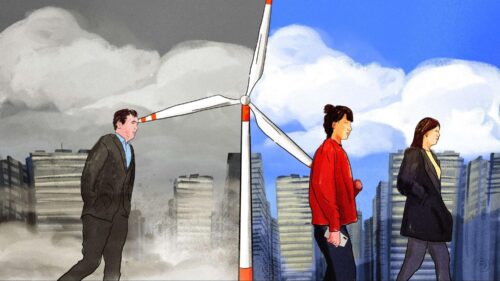U.S.-China cooperation on climate change: Q&A with Huang Zhong and Cary Krosinsky
Where do the U.S. and China currently stand on climate issues, and how might the incoming Joe Biden administration improve cooperation in this area?

The following article was recently published in the inaugural issue of the Intercollegiate U.S.-China Journal (IUCJ), a student-run publication that “aims to improve understanding of the United States’ and China’s domestic and international affairs.” It is republished here, with slight edits, with permission.
“The United States and China, despite different political systems and cultural roots, will inevitably affect other countries’ decisions on their own climate agendas.”
—Huáng Zhōng 黄忠, an entrepreneur with over 20 years of experience in the China-U.S. high-tech, aerospace, manufacturing, finance, education, and entertainment industries, and has advanced degrees in hydrogen energy and fuel cell technology. He is the co-founder and Executive Director for Asia at the Sustainable Finance Institute (SFI).
~
“I’m not sure many Americans realize how affected they have been by the current U.S. administration, in particular by the lack of respect and disinformation it has spread regarding China. Expect better relations and mutually enabled progress on climate change once the Biden administration comes in.”
—Cary Krosinsky is an educator, author, and advisor on sustainable finance whose ongoing teaching includes popular courses at Yale, NYU, and Brown. He is the author of Modern China: Financial Cooperation for Solving Sustainability Challenges.
~
The interviewer, Yanni Li, recently graduated from Wellesley College with a B.A. in Art History and Honors in East Asian Studies. She will be pursuing a master’s degree at Stanford University in fall 2021.
Yanni Li (YL): What successes and failures have China and the United States seen in recent years in renewable investment, and what is the current nature of their collaboration in this space?
Huang Zhong (HZ): China is leading the world in solar photovoltaic generation, with total installed capacity exceeding 200 GW by the end of 2019. Since overtaking Germany in 2015, China has been No. 1 in the world in solar power generation. China is the world’s largest market for both PV and solar thermal energy.
The total installed electricity generation capacity from wind power in China amounts to 236 GW, more than twice that of the world’s No. 2, the United States, which has a cumulative wind capacity of 105 GW. China is also the world’s No. 1 hydropower generator and is on track to overtake France as the world’s No. 2 nuclear generator in 2022 and to overtake the United States four years after that. China is also moving full speed ahead in developing the first nationwide hydrogen infrastructure in the world by 2024.
The United States could have taken the opportunity to lead the world and collaborate with China after joining the Paris Agreement in 2015. However, by pulling out of the Paris Agreement under the Trump administration, the United States is not only relinquishing leadership to China, but also falling behind in both innovation and investment.
There has been little cooperation between China and the United States in the past few years, except for in the private sector. For example, Tesla’s Model 3 is the top-selling EV in China, and GE Renewable Energy is building onshore and offshore wind turbines in China to satisfy the country’s growing demand for renewable energy.
Cary Krosinsky (CK): There has been more activity on renewable investment in the United States than meets the eye, but mostly in the private sector or at the state-level. I expect this to change under the Biden administration, which will likely pursue higher [miles per gallon] standards and re-establish Obama’s Clean Power Plan, among other actions to accelerate the U.S. transition to renewable energy. Much, however, will be up to executive order, as Congress is largely divided on this issue and will likely continue to be.
There has been a missed opportunity in the United States to educate people on the importance of climate action — greater consensus would guarantee more action. As things stand, that consensus is lacking, which is why a focus on education is greatly needed.
In recent years, bilateral exchanges between China and the U.S.’s energy industries have been greatly hindered by the trade war, in turn constraining the development of China’s nuclear power both domestically and internationally. How can China control global political risks in the energy sector and effectively respond to U.S. sanctions?
HZ: China will develop its clean energy industry with or without the United States, not only because its citizens demand better air and water, but also to ensure its energy security. China has benefited from turning innovation into high growth industries in the clean energy sector.
Take nuclear as an example. China’s first homemade third-generation nuclear reactor, made using its own Hualong One technology, is now generating electricity in eastern Fujian province, thereby breaking the monopoly held by foreign nuclear power technology. China is forging ahead with nuclear power to meet its clean energy targets of reaching peak carbon output before 2030 and reducing its reliance on coal-fired power. The deployment of these new 3G reactors should help President [Xí Jìnpíng 习近平] achieve his goal of carbon neutrality by 2060, as nuclear reactors do not emit greenhouse gases, such as carbon dioxide.
In the clean energy sector, China is mostly on an equal footing with the West, but has the advantages of long-term, consistent planning and execution, a large economy, and speedy innovation. It will be difficult for the United States to sanction China without hurting itself (and the world).
CK: This has been a big problem, but one we expect will change for the better under the incoming Biden administration. As has been called for by the likes of Bill Gates, this administration can help open the innovation floodgates. A coalition of leaders such as Gates advocating for cooperation on innovating nuclear strategies and other lower carbon alternatives would be most welcome.
It’s very costly to maintain fossil-based energy security, as evidenced by the U.S.’s decades-long security dilemma in the Middle East. China doesn’t want to compete with the U.S. for the control of global oil and gas resources. Further, China wants to offer better economic welfare and better water and air quality to its people. Renewable and nuclear energies are mostly localized and less affected by embargo or trade disputes. Turning to clean, renewable energy sources is the most logical energy security solution.
What are the economic benefits of sustainable development and climate action? What capacity do China and the U.S. have to finance such efforts and how can both countries jointly lead this movement?
HZ: China jumpstarted its renewable energy sector mainly to satisfy its growing appetite for economic growth (for example, the Three Gorges Dam project). But China has also discovered other positive effects of developing the renewables industry and has become a dominant player in this field. The solar power industry is one of the biggest in China, and government subsidies have helped bring down the cost of solar power not only in China, but across the whole world. Furthermore, China’s efforts in sustainable finance were rarely mentioned five years ago. This year, however, China has already set mandatory green finance goals for banks both big and small. Such positive domestic policy shifts will eventually spill over to other countries. I believe China is capable of turning the global climate crisis into an opportunity for innovation and economic advancement. More importantly, I believe China can become a true global leader in this field and help set a worldwide agenda.
I also believe that global partnerships are the only viable solution to critical issues such as climate change and sustainable transitions. The United States and China, being the world’s No. 1 and No. 2 economies, despite different political systems and cultural roots, will inevitably affect other countries’ decisions on their own climate agendas.
China and the West should work together on climate change for many reasons. First, climate change is a common challenge to every country, especially for the two largest economies. Second, climate change and sustainability are less sensitive compared to other national security matters. In fact, climate change is a planetary security matter that transcends any single country’s national security. Third, global investors are allocating more capital towards solving climate change. Fourth, consumers, especially younger generations, are increasingly climate conscious, and companies are starting to incorporate climate and sustainability concerns into their business models. Smarter companies see climate change as a big business opportunity.
With all these considerations, it’s hard to imagine why China wouldn’t want to be a global climate action leader. In fact, it has been trying to promote green and sustainability agendas through the Greening the Belt Road Initiative. Its large-scale economy can benefit other countries by exporting lower cost green products as demonstrated already by solar PV. Although Chinese President Xi Jinping’s pledge at the UN General Assembly in September to achieve carbon neutrality by 2060 surprised many, I believe this reflects China’s understanding of the importance of climate action and the opportunities that it presents.
CK: The U.S. low-carbon energy transition has benefited greatly from China’s solar panel construction industry. Over the past decade, the development of this industry has helped decrease the price of panels globally. This has greatly affected the levelized cost of energy (LCOE) of solar, making the transition more cost effective for Americans (such as myself, we installed solar last year in [Connecticut] where we live, where solar is likely to be a much cheaper option going forward).
This stands as an example of how the United States and China can work together to help each other’s low-carbon energy transitions, which hopefully can accelerate during the Biden administration, especially with the likes of Secretary [John] Kerry, who forged the original U.S.-China partnership leading up to the Paris Agreement and was recently placed in charge of climate change and foreign relations.
It was disappointing when the Obama administration passed on being involved in the Asian Infrastructure Investment Bank (AIIB). How can anyone influence an organization without being involved? That was a mistake I do not expect to be repeated by the Biden administration. Instead, I predict that the Biden administration will seek to cooperate with China on these global challenges.
After Biden takes office and China and the United States begin a new chapter in their relationship, will climate change and renewable energy become an area of competition or cooperation? Furthermore, to what extent will environmental issues be a part of the United States’s effort to reshape its global leadership, and how might this influence its policies regarding China?
HZ: Nowadays, China and the United States disagree on many things, including trade, the coronavirus, Huawei, and the South China Sea…Although climate change could be an area of cooperation between the two countries, it has also been a disputed issue and has almost totally disappeared from the State Department’s foreign policy agenda.
The United States and China are not only the world’s two largest economies, but also the largest greenhouse gas (GHG) emitters. The significance of a U.S.-China partnership on climate action cannot be underestimated. In fact, U.S.-China cooperation is the only way to solve the climate crisis that the world is facing. Cary and I led the world in this line of thought by authoring the book Modern China: Financial Cooperation for Solving Sustainability Challenges.
The Biden administration is poised to incorporate climate actions across the breadth of the federal government, from the departments of Agriculture to Treasury to State — expanding climate action beyond environmental agencies in order to accelerate U.S. efforts to mitigate global warming and acknowledge that the problem touches many aspects of American life.
China, on the other hand, has already elevated climate partnership as a key area that it can work with the EU closely on. After President Xi’s announcement of the 2060 carbon neutrality vision, the EU’s Minister of Foreign Affairs, Josep Borrell, stated, “Provided acts follow words, the announcement that China wants to be carbon neutral by 2060 could become a tipping point in the fight against climate change.”
Regardless of the United States’s wavering action on climate change, China and the EU have agreed to tackle the issue together. The United States needs to think very hard about whether it wants to keep its global leadership role.
CK: China’s relations with many countries have changed rapidly in recent years, even since our event the “Future of Sustainable Finance in China” in January 2019. I fully expect this rapid change to continue, as Biden is much more of a consensus builder, who is pressured to do what’s best for the economy, investors, and the environment. With Wall Street having rushed into China in recent years, there is potential for significant investment opportunities that I fully expect the United States and China to pursue together. This will also require further cooperation on issues of controversy, but through building better relations and badly needed mutual respect, we can find a consensus on the best ways forward. We hope to see the creation of safe spaces to work out areas of dispute, such as on technology, human rights, and the South China Sea.
I’m not sure many Americans realize how affected they have been by the current U.S. administration, in particular by the lack of respect and disinformation it has spread regarding China. Cultures always filter down from the top. Under current circumstances, Secretary Kerry’s appointment is a very exciting and important one. Kerry was furious in spring 2019 that the U.S.-China relationship had been allowed to deteriorate. Expect better relations and mutually enabled progress on climate change once the Biden administration comes in.
There is a great opportunity to work together, and there are many good reasons on both sides to make this happen. Expect the United States and China to partner to accelerate the low-carbon transition in many developing countries. This will be an exciting and important opportunity, one which will create many jobs, which if you are a student, you ought to be strongly considering.
The IUCJ is currently taking submissions, in both Chinese and English, for its next issue.






